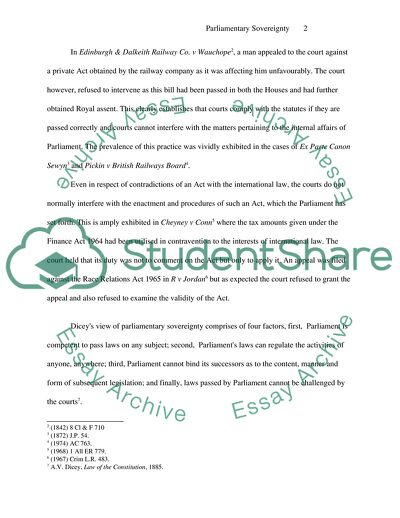
- Home
- Free Samples
- Premium Essays
- Editing Services
- Extra Tools
- Essay Writing Help
- About Us
- Studentshare
- Subjects
- Miscellaneous
- Parliamentary sovereignty
Parliamentary sovereignty - Essay Example

- Subject: Miscellaneous
- Type: Essay
- Level: Undergraduate
- Pages: 4 (1000 words)
- Downloads: 0
- Author: katheryntillman
Extract of sample "Parliamentary sovereignty"
Parliamentary supremacy connotes that it can legally enact legislation with regard to any subject matter. “Parliament has, under the English constitution, the right to make or unmake any law whatever; and further that no person or body is recognised by the law of England as having a right to override or set aside the legislation of Parliament.1” The doctrine of parliamentary sovereignty examines the relationship between Parliament or those who create the Acts and the courts or those who apply them.
In general courts will be totally unwilling to question the legitimacy of the statutes unless there is doubt regarding the correctness of the procedure employed while passing them. If an Act has been passed by both Houses of Parliament and has also received Royal Assent, then judges will not argue about its validity but will only apply it. In Edinburgh & Dalkeith Railway Co. v Wauchope2, a man appealed to the court against a private Act obtained by the railway company as it was affecting him unfavourably.
The court however, refused to intervene as this bill had been passed in both the Houses and had further obtained Royal assent. This clearly establishes that courts comply with the statutes if they are passed correctly and courts cannot interfere with the matters pertaining to the internal affairs of Parliament. The prevalence of this practice was vividly exhibited in the cases of Ex Parte Canon Sewyn3 and Pickin v British Railways Board4. Even in respect of contradictions of an Act with the international law, the courts do not normally interfere with the enactment and procedures of such an Act, which the Parliament has set forth.
This is amply exhibited in Cheyney v Conn5 where the tax amounts given under the Finance Act 1964 had been utilised in contravention to the interests of international law. The court held that its duty was not to comment on the Act but only to apply it. An appeal was filed against the Race Relations Act 1965 in R v Jordan6
...Download file to see next pages Read MoreCHECK THESE SAMPLES OF Parliamentary sovereignty
Public Law - Parliamentary Sovereignty
Parliamentary Sovereignty Issues
The doctrine of parliamentary sovereignty
Doctrine of Parliamentary Sovereignty
Is Parliamentary Sovereignty a Myth
UKs Doctrine of Parliamentary Sovereignty
Restraints to Parliamentary Sovereignty
Parliamentary Sovereignty Issues

- TERMS & CONDITIONS
- PRIVACY POLICY
- COOKIES POLICY